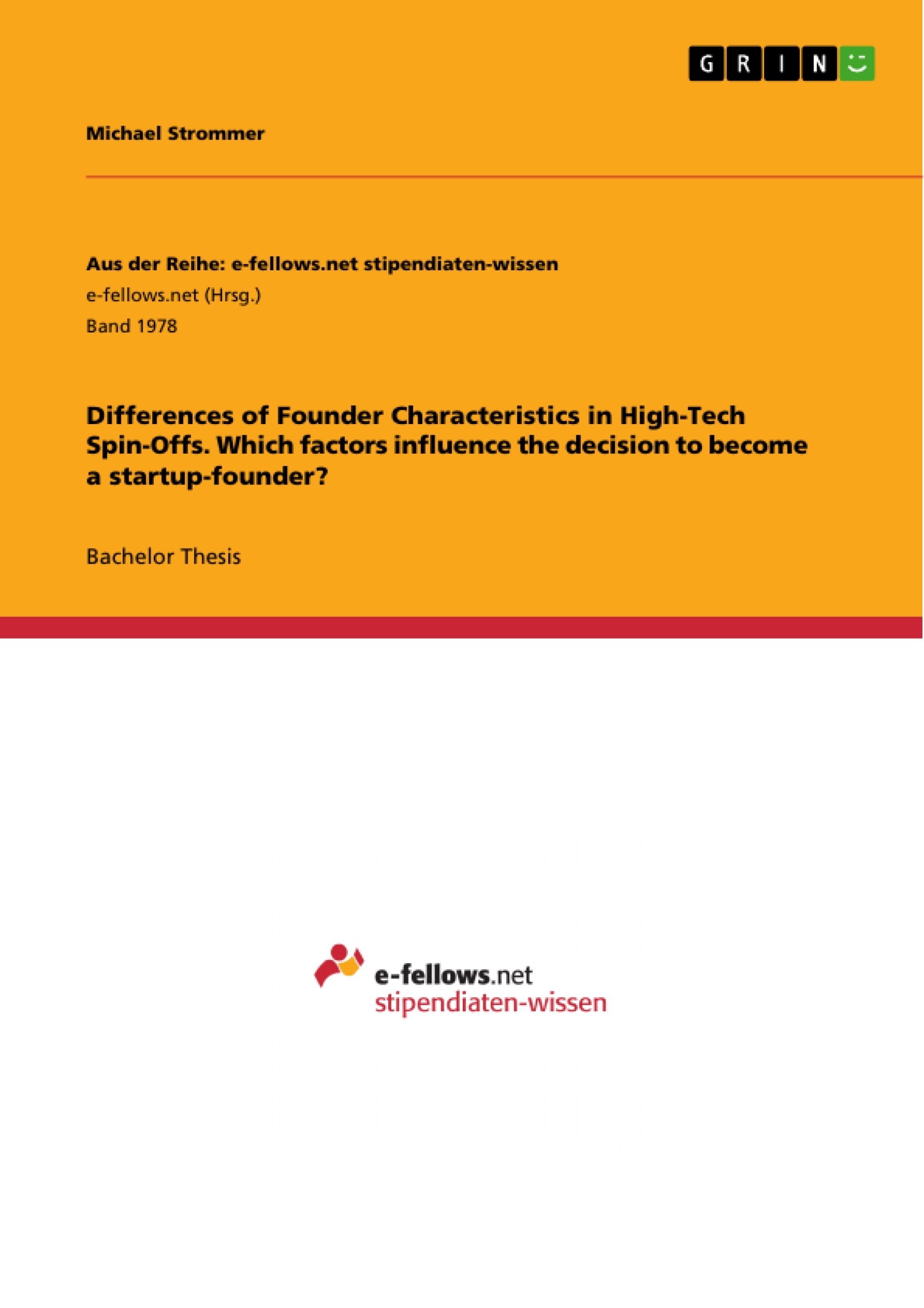Entrepreneurship is a booming topic. More and more entrepreneurs set out to launch their own startups to eventually turn them into unicorns one day. But what makes people choose a risky, unsafe alternative over a safe, waged employment? I digged into personal motives, social and cultural aspects to fully understand the drivers of entrepreneurship. To get empirical evidence, a study among startup founders from TU Munich was conducted.
Chapter 1 will therefore describe the nature of HTSOs, differentiate their nature from non-technology start-ups and further highlight their importance in securing economic progress. After getting an understanding of the topic’s importance to the business community and why exactly such specific foundations are subject of this thesis, the focus in Chapter 2 shifts from an institutional to a personal level.
Chapter 2 will investigate different theories which explain how an individual’s characteristics and personality are shaped throughout the course of life. This is important to get an understanding of the core subject of this thesis, the individuals who have come-up with promising innovations and founded their own spin-off. Research on start-ups and their founders is relatively new compared to traditional fields of studies, but has already contributed remarkable insights into founder characteristics, personality traits of founders and success factors of start-ups in general.
Chapter 3 is dedicated to the empirical section of this thesis, describing the methodology of the survey and conducting a descriptive analysis of the survey findings. In a second step, the results are discussed and elaborated on in more detail.
Inhaltsverzeichnis (Table of Contents)
- 1 INTRODUCTION
- 2 HIGH-TECH SPIN-OFFS
- 2.1 Classification of High-Tech Spin-Offs
- 2.1.1 Definition of High-Tech
- 2.1.2 Definition of High-Tech Spin-Offs
- 2.2 Parent Organization's Relevance
- 2.2.1 Setting an Impetus for Entrepreneurship
- 2.2.2 Power of Reputation
- 2.3 From Storehouse to Factory of Knowledge
- 3 FOUNDER CHARACTERISTICS
- 3.1 Trait Theory
- 3.1.1 Need for Achievement
- 3.1.2 Locus-of-Control
- 3.1.3 Effectuation
- 3.1.4 Tolerance of Ambiguity
- 3.2 Socio Cultural Theory
- 3.2.1 Social Capital
- 3.2.2 Cultural Capital
- 3.3 Human Capital
- 3.4 Entrepreneurial Human Capital
- 4 EMPIRICAL RESEARCH
- 4.1 Methodology
- 4.2 Descriptive Analysis
- 4.2.1 Demographic Characteristics
- 4.2.2 Venture Characteristics
- 4.2.3 Entrepreneurial Characteristics
- 4.2.4 The average High-Tech Spin-Off Founder
- 4.3 Discussion
- 4.3.1 Impact of Self-Efficacy on Perceived Success
- 4.3.2 Impact of Previous Founding Experience on Perceived Success
- 4.3.3 Impact of Human Capital on Perceived Success
Zielsetzung und Themenschwerpunkte (Objectives and Key Themes)
This thesis aims to investigate the differences in founder characteristics within high-tech spin-offs. The study explores the influence of various factors on the success of these ventures.
- The role of parent organizations in fostering entrepreneurship within high-tech spin-offs.
- The impact of founder traits, including need for achievement, locus of control, and tolerance for ambiguity, on venture success.
- The influence of social and cultural capital on the entrepreneurial journey.
- The significance of human capital and entrepreneurial human capital in driving venture success.
- The relationship between founder characteristics and perceived success in high-tech spin-offs.
Zusammenfassung der Kapitel (Chapter Summaries)
- Chapter 1: Introduction This chapter sets the stage for the thesis, outlining the research question and objectives. It provides context for the study by highlighting the importance of high-tech spin-offs and the need to understand the factors contributing to their success.
- Chapter 2: High-Tech Spin-Offs This chapter delves into the definition and characteristics of high-tech spin-offs. It examines the role of parent organizations in supporting and influencing these ventures. The chapter also discusses the flow of knowledge from parent organizations to spin-offs.
- Chapter 3: Founder Characteristics This chapter explores various theoretical frameworks related to founder characteristics. It examines the role of trait theory, socio-cultural theory, and human capital in shaping entrepreneurial success. This chapter provides a comprehensive overview of the factors that influence the entrepreneurial journey of founders.
- Chapter 4: Empirical Research This chapter presents the methodology and findings of the empirical study conducted to investigate the relationship between founder characteristics and perceived success in high-tech spin-offs. The chapter analyzes data on demographic characteristics, venture characteristics, entrepreneurial characteristics, and the impact of specific factors on perceived success.
Schlüsselwörter (Keywords)
This thesis focuses on key terms and concepts such as high-tech spin-offs, founder characteristics, entrepreneurial human capital, social capital, cultural capital, perceived success, and the role of parent organizations in fostering entrepreneurship. The research explores the relationship between these concepts and their influence on the success of high-tech spin-offs.
Frequently Asked Questions
What is a High-Tech Spin-Off (HTSO)?
An HTSO is a startup founded based on promising innovations or knowledge transferred from a parent organization, such as a university or research institute.
What personality traits are common in startup founders?
Key traits examined in the thesis include the need for achievement, locus of control, and tolerance for ambiguity.
How does "Human Capital" influence venture success?
Human Capital refers to the founder's education, skills, and experience, which significantly impact the perceived success and growth of high-tech startups.
What is "Social and Cultural Capital" in entrepreneurship?
It involves the networks, reputation, and social standing of the founder, which help in securing resources and building trust in the business community.
What was the focus of the study at TU Munich?
The empirical research conducted a descriptive analysis of startup founders at TU Munich to understand their demographic and entrepreneurial characteristics.
- Quote paper
- Michael Strommer (Author), 2016, Differences of Founder Characteristics in High-Tech Spin-Offs. Which factors influence the decision to become a startup-founder?, Munich, GRIN Verlag, https://www.grin.com/document/335596



